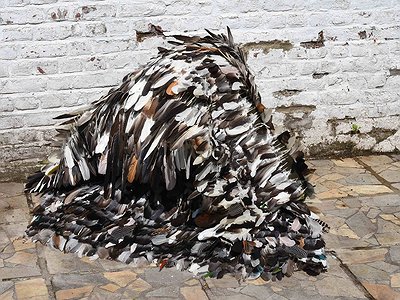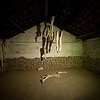Many writers have claimed that as soon as they enter into the process, certain aspects of the narrative are out of their hands. Do you like to keep strict control over the process or is there a sense of following things where they lead you?
For me the word 'process' implies things are happening that are beyond your control. Life is a process. To be alive means to accept vulnerability and imperfection. I prefer to be guided by what presents itself. In a society that is quite obsessed with results, planning and deadlines, this is difficult to work with. Especially if I work on bigger projects with more budget and a team. I like to create frameworks within which freedom reigns. It's like jazz. There is a structure, maybe a roadmap, with a few rules and roles lied out. Then I allow myself to get off the road and find new pathways. Improvisation is a skill. It is fragile and requires deep listening, trust and receptivity. It is also very much alive.
The installation LEGS originated from a vision of twenty legs hanging from the ceiling. By first learning the process of ceramic making, I found out that working with clay requires patience. The creation of the legs developed into a balancing act between grounded inertia and the will to move forward. There was a friction between 'the hands' and 'the head', between ambitions and reality, between poor expertise and the urge for perfection. This process became the eventual work. It took me two years all together.
Especially in the digital age, the writing and production process tends towards the infinite. What marks the end of the process? How do you finish a work?
In performance art, the end of a creation process is often marked by a première, the first time you share your work with an audience. It is an important moment. Only through sharing a creation with an audience, can you know what you actually created. Personally, I don't see this moment as the end of a process, rather as an essential next step, the beginning of a new phase in which the work takes new forms according to the context in which it is presented and the interaction with the audience. A creation is a living organism in constant transformation. A work is only finished when it is moved towards the archive and not presented anymore.
Once a piece is finished, how important is it for you to let it lie and evaluate it later on? How much improvement and refinement do you personally allow until you're satisfied with a piece? What does this process look like in practice?
The way people experience sound, or art in general, is very subjective and temporary. Especially these days people listen or watch with different devices, in between circumstances, in all sorts of (noisy) environments, on mostly cheap headphones, with poor attention spans. The context in which a creative work is presented influences the way it will be perceived and the set-up of the work too. I find it interesting to build in this flexibility and let the environment exert its influence.
I also find it important to get as far as possible with a project but, at the same time, to be mild towards myself. This is the best I can do now, within the current circumstances, with the available budget, with the knowledge I now have, ...etc. Perfection is often something artists impose on themselves, not something the outside world expects. To embrace imperfection is a skill I practice every day.
What role does sound and silence play in your work?
In Japanese Butoh it is said that the performer moves from within. You are moved. In essence Butoh is a practice of deep listening. It is the reason that a lot of Butoh performances are slow. Slowing down allows the body to feel and capture in detail and then move with this information. The body becomes an antenna. You can do Butoh with every possible music that exists as long as you don't dance on the music but rather move with it or let yourself be moved by it. Remember John Cage's lesson that music can be all kinds of sound, including the silence between sound. It is no different with movement. By including 'stops', the dancer allows moments of deep listening, of inner orientation and (re)directing energy. The same I do in my daily life during days of seemingly doing nothing.
What is your most vivid music memory?
The music that can still give me goosebumps is Chariots of Fire from Vangelis. We had this record at home. I asked my parents to put the LP on when going to bed, leaving the door ajar. The music immediately triggered a phantasy in which I saw myself dancing to these melodies. A little girl on a huge stage. Although it was actually more flying than dancing. I was 8 years old and just started to take ballet classes.




